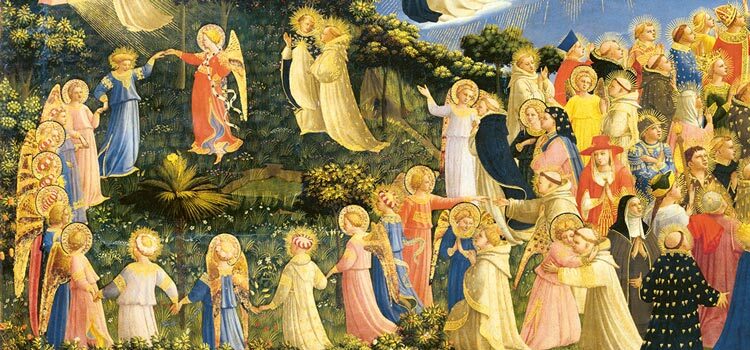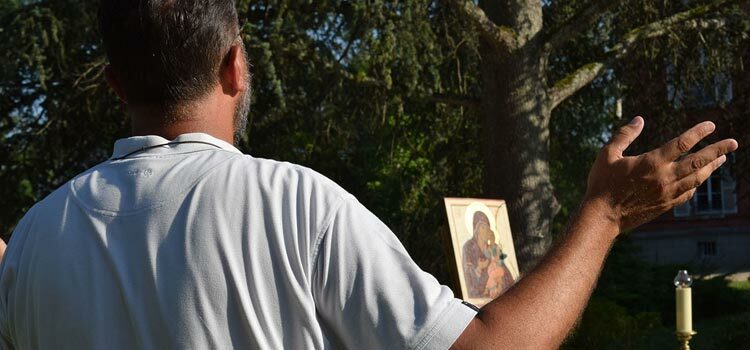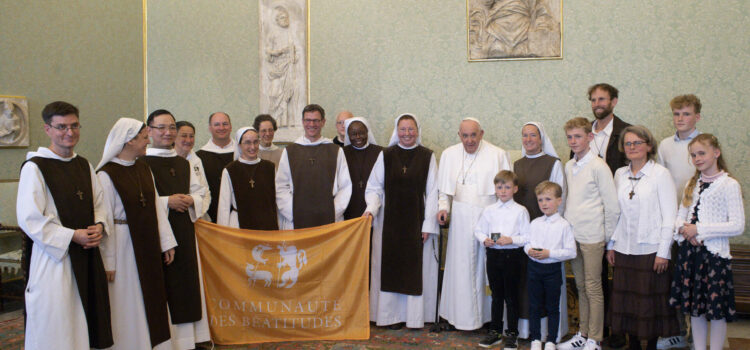Prayer of the heart, or « ceaseless prayer » derives from St Paul’s invitation to the Thessalonians Christians: « Pray constantly! » (1 Thes 5,17).
When we evoke prayer of the heart, we think spontaneously about the prayer of the monks, but also of « The way of a Pilgrim » and the Jesus Prayer. More than forty years ago, many Christians in Western countries (among them our community) discovered with wonder the Orthodox tradition: Icons, byzantine liturgy, some famous orthodox saints as our Father St Seraphim of Sarov and, of
course the « Small Philokalia ».
The Holy Spirit’s prayer in our heart
Prayer of the heart is often identified with the « Jesus prayer » (or prayer to Jesus), because He is the one we pray to in this short invocation « Lord Jesus, Son of God, have mercy on me, a sinner » often in tempo with our breathing. Maybe we should acknowledge that prayer of the heart is broader, in time and space, than just this invocation?
Surely, constant prayer does not identify with one formula alone, because they can be extremely varied and different. The last example we have given can be prayed in the traditional way we have quoted above, but one can also concentrate on one word only, « Jesus » or « Abba ». Some may yet use the word « Ruah » (breath) which acts as an inner epiclesis in calling to the Spirit in our hearts. Of course, these formulas, which have been received sometimes very personally in prayer, must be submitted and confirmed by one’s spiritual Father. A very simple lay brother achieved constant prayer with the simple invocation « Jesus, Mary, Joseph » In fine, is not constant prayer the prayer of the Holy Spirit within?
Method, a path leading to union with God
A method, as inspired as it might be, is never an aim in itself. It is a way among others, the aim is to lead us to union with God.
Beyond this search and this action of God, does it not aim to control our thoughts? In other words, how can we simplify and canalize this constant inner restlessness to turn it toward God? A short invocation (said alone) can be a help and a shield again the bubbling inner thoughts which interfere. Every word of this formula is important to enable us to enter little by little in this divine communion and be « captivated ». One can understand that that prayer, for many spiritual people (« animated by the Breath ») has become as natural as breathing, in their whole life, in all their activities, from the most humble ones in their life, such as when sleeping.
As quoted in the Song of songs « I slept but my heart was awake » (Song 5,2).
Philokalia or a call to beauty
What does the word « philokalia » mean?
In Greek the term stands for love of beauty, which is identical to what is Good (kalos).
This spiritual beauty is God’s very own beauty which He wishes to chisel in our hearts through His Holy Spirit. This beauty is also that of our baptismal grace which grows to its full potential.
We are made for divine beauty because God is infinitely beautiful. How could God, with his Holy Spirit, not work for it intensely, since we have become « theophores » (« bearers of God »)
Constant prayer has, not only a pedagogical (technical) aspect to fight against thoughts, but, above all, it is a profession of theological and even Trinitarian faith.
The following formula illustrates this very well: « Lord Jesus, Son of God, have mercy on me (a sinner) ». According to an explanation of the Fathers: The « Lord » refers to the Holy Spirit, without whom we cannot say « Jesus is Lord » « Jesus » refers to the Savior and « Son of God » is linked with the Father.
The imploration « Have mercy on me, a sinner » is the publican’s who was justified by the Lord in the Gospel according to St Luc (cf. Lk 18). Everyone’s rayer is made of regularity and faithfulness, through trials and, let’s say it, efforts. In fact, a time of growth goes hand in hand with a humble and patient practice.
We must not lose heart but persevere like the poor widow in the Gospel.
Conclusion
Yes, prayer is hard work, it is not magical! It is God’s work in us with the contribution of « our two small coins ». The « chotki » is, we could say, « the shuttle to weave prayer ». Who, amongst us, was not carrying it at the beginning of the community?
Repeating the Name (or a short prayer) ‘gathers up’ our heart, shuts our door on « mundane » thoughts and distractions and introduces us in His Presence. May the Holy Spirit lead our hearts toward a more and more simple and deep prayer…
The quotation
“The prayer of the heart is simply, finding the attitude by which the Father can sanctify His Name in me. ” A Carthusian
TO GO FURTHER…Only for todayIs there a word, a formula, which helps me to go down into my heart to join up with the Presence of the Lord? Books
|
Find the previous articles in our “Life of prayer” series.
(publication edited by brothers and sisters of the Community of the Beatitudes – © rights reserved).






